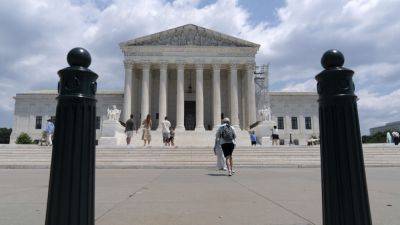Supreme Court sides with fishermen in landmark case deciding fate of the administrative state
The Supreme Court on Friday ruled in favor of a group of fishermen who challenged a decades-old legal doctrine that they say gave the administrative state too much power over their business.
In a 6-2 ruling where Justice Ketanji Brown Jackson did not participate, the court's majority said the federal rule promulgated by the National Oceanic and Atmospheric Administration (NOAA) requiring the fishermen to pay $700 a day for an "at-sea monitor" is out of the bounds Congress set for the federal agency.
The justices in January heard the arguments of two cases stemming from lawsuits brought by New Jersey fishermen and herring fishermen from Rhode Island challenging NOAA's rule, which they say threatened to ruin their livelihoods.
The court's decision overruled what is known as the Chevron doctrine — a legal theory established in the 1980s that says if a federal regulation is challenged, the courts should defer to the agency’s interpretation of whether Congress had granted it authority to issue the rule, as long as the agency's interpretation is reasonable and Congress had not addressed the question directly.
"Chevron is overruled," Chief Justice John Roberts wrote for the court's majority.
SUPREME COURT APPEARS READY TO REEL IN ADMINISTRATIVE STATE IN LANDMARK CHALLENGE FROM EAST COAST FISHERMEN
Video"Courts must exercise their independent judgment in deciding whether an agency has acted within its statutory authority, as the APA requires. Careful attention to the judgment of the Executive Branch may help inform that inquiry. And when a particular statute delegates authority to an agency consistent with constitutional limits, courts must respect the delegation, while ensuring that the agency acts within it," he wrote.
"But







